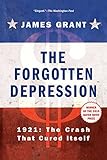The forgotten depression : the crash that cured itself/ James Grant
Language: eng Publication details: New York: Simon et Schuster Paperbacks, 2014Description: 254 p.: ill.; 23 cmISBN:- 9781451686463
- HB 371 G762f 2014
| Item type | Current library | Home library | Collection | Shelving location | Call number | Copy number | Status | Date due | Barcode |
|---|---|---|---|---|---|---|---|---|---|
 Libro
Libro
|
Biblioteca Juan Bosch | Biblioteca Juan Bosch | Ciencias Sociales | Ciencias Sociales (3er. Piso) | HB 371 G762f 2014 (Browse shelf(Opens below)) | 1 | Available | 00000144014 |
Browsing Biblioteca Juan Bosch shelves, Shelving location: Ciencias Sociales (3er. Piso), Collection: Ciencias Sociales Close shelf browser (Hides shelf browser)

|
No cover image available |

|

|

|
No cover image available |

|
||
| HB 251 R546r 2011 The rational optimist : how prosperity evolves / | HB301 .B877 1962 The economics of labor. | HB 340.12 M617o 2015 Once upon a time in Russia : the rise of the oligarchs -- a true story of ambition, wealth, betrayal, and murder / | HB 371 G762f 2014 The forgotten depression : the crash that cured itself/ | HB 401 B222t 1997 Teoría económica del capitalismo rentístico : economía, petróleo y renta / | HB 501 El imperialismo, fase superior del capitalismo (ensayo popular) | HB 501 F8518.2009 El capitalismo : una breve Introduccion / |
By the publisher of the prestigious Grant's Interest Rate Observer, an account of the deep economic slump of 1920-21 that proposes, with respect to federal intervention, "less is more." This is a free-market rejoinder to the Keynesian stimulus applied by Bush and Obama to the 2007-09 recession, in whose aftereffects, Grant asserts, the nation still toils. James Grant tells the story of America's last governmentally-untreated depression; relatively brief and self-correcting, it gave way to the Roaring Twenties. His book appears in the fifth year of a lackluster recovery from the overmedicated downturn of 2007-2009. In 1920-21, Woodrow Wilson and Warren G. Harding met a deep economic slump by seeming to ignore it, implementing policies that most twenty-first century economists would call backward. Confronted with plunging prices, wages, and employment, the government balanced the budget and, through the Federal Reserve, raised interest rates. No "stimulus" was administered, and a powerful, job-filled recovery was under way by late in 1921. In 1929, the economy once again slumped--and kept right on slumping as the Hoover administration adopted the very policies that Wilson and Harding had declined to put in place. Grant argues that well-intended federal intervention, notably the White House-led campaign to prop up industrial wages, helped to turn a bad recession into America's worst depression. He offers the experience of the earlier depression for lessons for today and the future. This is a powerful response to the prevailing notion of how to fight recession. The enterprise system is more resilient than even its friends give it credit for being, Grant demonstrates.


There are no comments on this title.